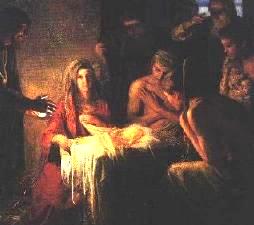“Let all mortal flesh keep silence . . .”
This 1600 year-old hymn is, I think, my favorite Christmas song
– not just for the beauty of its melody, but because its opening
line captures for me what has to be the only proper response to
what we celebrate today. What it means for God to become human is
so hard to get our heads around that the Church gives us three different
approaches in the Christmas Masses. We are like the six blind men
trying to grasp what an elephant is by feeling parts of it. To think
that the God who created everything that exists – from quarks
to galaxies – who has conferred on them the properties that
order our universe – who continues to create all living things,
from bacteria to, yes, elephants – should enter into created
reality, should take on our flawed humanity – it is simply
too much to grasp.
Not just “How could that be”, but “Why would God
do that”?
The “why” of Christmas is, simply, love – not
just attraction, not just affection, not just passion, but pure,
unalloyed self-giving. Creation itself is a foretaste of that self-giving
– sharing the existence that is eternal in God. But the incarnation
takes God’s self-giving to a totally new level. In Jesus we
recognize that self-giving is the very nature of God. The reading
from Hebrews from the Mass at Day makes precisely that point. No
more partial insights, no more groping to comprehend the elephant.
Jesus is “the very imprint of God’s being.”
Among the great things about working in a place like Creighton are
the extensive programs of service to others – projects in
Appalachia, the Dominican Republic, Omaha’s own Siena-Francis
House and One World – faculty, staff, and students alike –
working, teaching, and learning in a climate where service to others
is almost a part of the air we breathe. We often do it poorly. Still,
we do it. It all flows from the self-giving of God that we celebrate
today – a thousand roads leading out from the stable at Bethlehem.
But there is one difference. At the end of our summers or spring
breaks or semesters, we go “home” again – back
to our “normal” lives, leaving behind those whom we
have for a while helped unselfishly. The God man whose birth we
celebrate did not do that. Instead, as the canticle in Paul’s
Letter to the Philippians stresses, he accepted our death, “even
death on a cross”. His way home took him through Calvary.
It has been truly said that the stable at Bethlehem stands in the
shadow of the cross. It is, after all, the cross that makes concrete
the love manifested in Bethlehem. That is something we desperately
need to grasp – not as a “downer” at this joyful
season, but so that we can understand that truly “normal”,
truly human, life consists of total self-giving. For Jesus
is not just the “very imprint of God’s being”
but the norm – as in “normal” –
the very model of what true humanity is.
The ancient hymn continues:
“. . . and in fear and trembling stand. Christ our God
to earth descendeth . . .”
